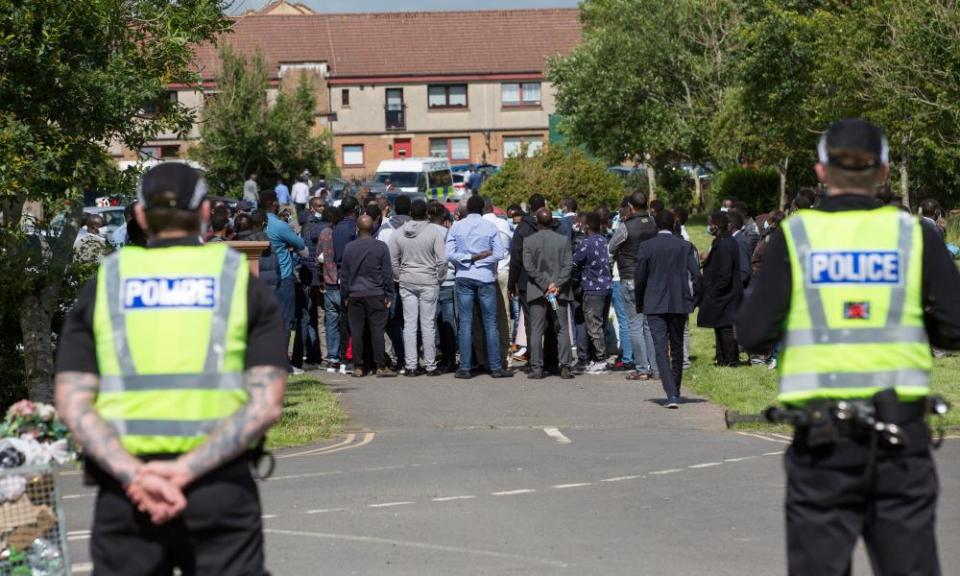Hundreds of Glasgow asylum seekers still in 'untenable' hotel accommodation

Hundreds of vulnerable asylum seekers remain in “untenable” hotel accommodation in Glasgow a month after a man stabbed six people including a police officer at a city centre hotel before being shot dead by police.
While campaigners welcomed the fact that former residents of the Park Inn, where the stabbing by Badreddin Abadlla Adam took place, have been moved back to long-term accommodation, they said that those still housed by the private housing provider Mears in hotels around Glasgow were losing hope.
Hotel residents have told the Guardian that conditions remain stressful and isolating, with poor quality food a continuing problem and no concrete information about when they will be moved back to long-term accommodation in the community, despite commitments from Mears and the Home Office to move quickly.
Related: After the Glasgow hotel attack, a week of shock, anger and compassion
Police Scotland confirmed one incident where officers were called by hotel staff who were suspicious of a resident who entered his room with a bag, which transpired to contain donated clothing.
Mears confirmed that all former residents of the Park Inn, many of whom were profoundly distressed by the stabbings and their aftermath, have moved into suitable dispersed accommodation. But it was unable to give a timeline for the moving of other hotel residents into flats, saying: “We are making further moves and are doing so in a planned way when suitable property becomes available. This can only be done where the local authority is happy for us to procure accommodation.”
Graham O’Neill, a policy manager for the Scottish Refugee Council, said: “Around 300 vulnerable asylum seekers in Glasgow have now been stuck in hotel rooms for four months. A further 4,500 are in the same predicament across the UK, in 53 hotels.”
Those moved by Mears from long-term accommodation to six hotels in Glasgow city centre at the beginning of lockdown had all financial support withdrawn, leaving them unable to supplement meals with bottled water or fresh fruit or to top up phones for vital communication with family and lawyers. Despite a commitment from the immigration minister Chris Philp immediately after the stabbings to consider providing small cash payments, there has been no progress on this.
“As a result, people have no real control over their lives, they suffer and lose hope,” said O’Neill. “Hotels are not homes. People are being held in institutional accommodation, plain and simple.
“We are glad that everybody who was in Park Inn has now been moved out of hotels and into suitable longer-term accommodation. However, it is dreadful and should be untenable that one month on from the Park Inn tragedy around 300 vulnerable men and women remain in hotel rooms in Glasgow.”
Chris Stephens, the SNP MP for Glasgow South West, who has consistently raised concerns about the living conditions and mental health of asylum seekers in hotels, said the fact they remained in unsuitable accommodation a month later was “an outrage”.
Stephens again called on the HomeOffice to carry out an urgent investigation into the “clear institutional failures” that have arisen during the pandemic, a demand Philp previously refused to commit to.
Robina Qureshi, of the refugee homelessness charity Positive Action in Housing, said there was “an ongoing humanitarian crisis in this city as a result of these hotel moves”, adding that many of those moved to flats reported they were dirty and had faulty appliances. “Almost every person being moved has little or no access to money, food or wifi.”
A Home Office spokesperson said: “During the pandemic asylum seekers who are destitute are provided with free, furnished accommodation, paid utility costs and financial allowances. Free healthcare and education for children is also provided.
“All of the asylum seekers affected by the incident at the Park Inn in Glasgow were provided with a one-off payment to assist whilst their belongings were inaccessible.”

 Yahoo News
Yahoo News 